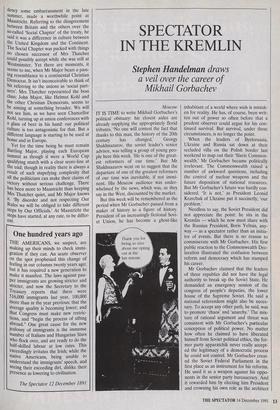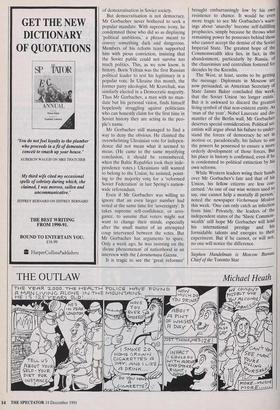SPECTATOR IN THE KREMLIN
Stephen Handelman draws
a veil over the career of Mikhail Gorbachev
Moscow IT IS TIME to write Mikhail Gorbachev's political obituary: his closest aides are already supplying the appropriately florid tributes. 'No one will contest the fact that thanks to this man, the history of the 20th
century has changed,' Georgy Shakhnazarov, the soviet leader's senior advisor, was telling a group of young peo- ple here this week. 'He is one of the great- est reformers of our time.' But Mr Shakhnazarov went on to suggest that the departure of one of the greatest reformers of our time was inevitable, if not immi- nent. His Moscow audience was under- whelmed by the news, which was, as they say in the West, discounted by the market.
But this week will be remembered as the period when Mr Gorbachev passed from a maker of history to a figure of history. President of an increasingly fictional Sovi- et Union, he has become a ghost-like inhabitant of a world where wish is mistak- en for reality. He has, of course, been writ- ten out of power so often before that a prudent observer could argue for his con- tinued survival. But survival, under these circumstances, is no longer the point.
When the leaders of Byelorussia, Ukraine and Russia sat down at their secluded villa on the Polish border last weekend to map out their 'Slavic Common- wealth,' Mr Gorbachev became politically irrelevant. The Commonwealth raised a number of awkward questions, including the control of nuclear weapons and the future disposition of national resources. But Mr Gorbachev's future was hardly con- sidered. 'It is not,' as President Leonid Kravchuk of Ukraine put it succinctly, 'our problem.'
Needless to say, the Soviet President did not appreciate the point: he sits in the Kremlin — which he now must share with the Russian President, Boris Yeltsin, any- way — as a spectator rather than an initia- tor of events. But there is no reason to commiserate with Mr Gorbachev. His first public reaction to the Commonwealth Dec- laration illustrated the confusion between reform and democracy which has stamped his career.
Mr Gorbachev claimed that the leaders of three republics did not have the legal authority to break up the Soviet State. He demanded an emergency session of the congress of people's deputies, the lower house of the Supreme Soviet. He said a national referendum might also be neces- sary. To accept any other path, he said, was to promote 'chaos' and 'anarchy.' The mix- ture of rational argument and threat was consistent with Mr Gorbachev's particular conception of political power. No matter how often he claimed to have liberated himself from Soviet political ethics, the for- mer party apparatchik never really accept- ed the legitimacy of a democratic process he could not control. Mr Gorbachev creat- ed the Soviet Federal Parliament in the first place as an instrument for his reforms. He used it as a weapon against his oppo- nents in the senior party bureaucracy. And it rewarded him by electing him President and crowning his own role as the architect
of democratisation in Soviet society.
But democratisation is not democracy. Mr Gorbachev never bothered to seek a popular mandate. With supreme irony, he condemned those who did so as displaying `political ambitions,' a phrase meant to convey something dark and dangerous. Members of his reform team supported him with pious conviction, insisting that the Soviet public could not survive too much politics. This, as we now know, is history. Boris Yeltsin was the first Russian political leader to test his legitimacy in a popular vote. In Ukraine this month, the former party ideologist, Mr Kravchuk, was similarly elected in a Democratic majority. Thus Mr Gorbachev, a man with no man- date but his personal vision, finds himself hopelessly struggling against politicians who can honestly claim for the first time in Soviet history they are acting in the peo- ple's name.
Mr Gorbachev still managed to find a way to deny the obvious. He claimed the overwhelming Ukrainian vote for indepen- dence did not mean what it seemed to mean. (He came to the same mystifying conclusion, it should be remembered, when the Baltic Republics took their inde- pendence votes.) Ukrainians still wanted to belong to the Union, he insisted, point- ing to the majority vote, for a 'reformed Soviet Federation' in last Spring's nation- wide referendum.
Even if Mr Gorbachev was willing to ignore that an even larger number had voted at the same time for 'sovereignty'. It takes supreme self-confidence, or arro- gance, to assume that voters might not want to change their minds, especially after the small matter of an attempted coup intervened between the votes. But Mr Gorbachev has arguments to spare. Only a week ago, he was insisting on the `divine phenomenon' of nationhood in an interview with the Literatumaya Gazeta.
It is tragic to see the 'great reformer'
brought embarrassingly low by his own resistence to chance. It would be even more tragic to see Mr Gorbachev's warn- ings about 'anarchy' become self-fulfilling prophecies, simply because he throws what remaining power he possesses behind those who cannot accept the demise of the Soviet Imperial State. The greatest hope of the Commonwealth idea lies, in fact, in the abandonment, particularly by Russia, of the chauvinism and centralism fostered for decades by the Kremlin.
The West, at least, seems to be getting the message. Diplomats in Moscow are now persuaded, as American Secretary of State James Baker concluded this week, that the Soviet Union 'no longer exists.' But it is awkward to discard the greatest living symbol of that non-existent entity. As `man of the year', Nobel Laureate and dis- mantler of the Berlin wall, Mr Gorbachev deserves special consideration. Political sci- entists will argue about his failure to under- stand the forces of democracy he set in motion or, paradoxically, his failure to use the powers he possessed to ensure a more orderly development of those forces. But his place in history is confirmed, even if he is condemned to political extinction by his own reforms.
While Western leaders wring their hands over Mr Gorbachev's fate and that of his Union, his fellow citizens are less con- cerned. 'As one of our wise writers used to, say, one cannot help a mortally ill person,' noted the newspaper Vechernaya Moskva this week. 'One can only catch an infection from him.' Privately, the leaders of the independent states of the 'Slavic Common- wealth' still hope Mr Gorbachev will lend his international prestige and his formidable talents and energies to their experiment. But if he cannot, or will not, no one will notice the difference.
Stephen Handelman is Moscow Bureau Chief of the Toronto Star



































































 Previous page
Previous page